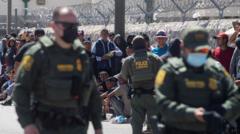As President-elect Donald Trump mobilizes for mass deportation efforts, Texas authorities have stepped forward with a significant land offer for detention facilities.
Texas Offers Trump Land for Migrant Detention Facilities

Texas Offers Trump Land for Migrant Detention Facilities
Texas government proposes 1,400 acres for future migrant processing amid ongoing border debate.
Texas authorities have extended an offer of 1,400 acres of land in Starr County, located in the Rio Grande Valley along the US-Mexico border, to President-elect Donald Trump. The intent of this land is to develop detention facilities that would accommodate the largest deportation effort aimed at undocumented migrants in the country’s history, as stated in a letter from the Texas General Land Office.
Trump, who has long maintained his commitment to deport millions of undocumented migrants and bolster border security, might face substantial challenges under his aggressive immigration agenda. Logistical issues, financial constraints, and imminent legal battles with human rights activists could potentially thwart his plans.
Dawn Buckingham, Texas Land Commissioner, emphasized that the land is suitable for construction, currently being flat farmland, and would provide an efficient location for a new detention center, as outlined in an interview with Fox News.
While Texas's support for Trump's initiatives is evident following its own border security operations launched after his presidency, Democratic governors from California, Arizona, and New Mexico have openly rejected the idea of cooperating with mass deportations.
The design of the proposed detention facilities remains ambiguous, though Trump’s administration has discussed implementing various models, from soft-sided camps to traditional brick-and-mortar establishments. With allegations of insufficient infrastructure, experts warn that if mass deportations commence, Immigration and Customs Enforcement (ICE) could exceed their capacity limits.
The announcement of this land offer coincides with a broader opposition from Democratic areas against Trump's deportation goals, highlighting a stark divide in how different states manage immigration policy. Analysts caution that these developments may lead to a fragmented landscape of immigration enforcement across the nation, intensifying the contrast between Republican and Democratic-led states.
The discourse surrounding the construction and operation of these facilities will be pivotal in shaping the future of US immigration policy, with ongoing debate anticipated as Trump's initiatives unfold.
Trump, who has long maintained his commitment to deport millions of undocumented migrants and bolster border security, might face substantial challenges under his aggressive immigration agenda. Logistical issues, financial constraints, and imminent legal battles with human rights activists could potentially thwart his plans.
Dawn Buckingham, Texas Land Commissioner, emphasized that the land is suitable for construction, currently being flat farmland, and would provide an efficient location for a new detention center, as outlined in an interview with Fox News.
While Texas's support for Trump's initiatives is evident following its own border security operations launched after his presidency, Democratic governors from California, Arizona, and New Mexico have openly rejected the idea of cooperating with mass deportations.
The design of the proposed detention facilities remains ambiguous, though Trump’s administration has discussed implementing various models, from soft-sided camps to traditional brick-and-mortar establishments. With allegations of insufficient infrastructure, experts warn that if mass deportations commence, Immigration and Customs Enforcement (ICE) could exceed their capacity limits.
The announcement of this land offer coincides with a broader opposition from Democratic areas against Trump's deportation goals, highlighting a stark divide in how different states manage immigration policy. Analysts caution that these developments may lead to a fragmented landscape of immigration enforcement across the nation, intensifying the contrast between Republican and Democratic-led states.
The discourse surrounding the construction and operation of these facilities will be pivotal in shaping the future of US immigration policy, with ongoing debate anticipated as Trump's initiatives unfold.























